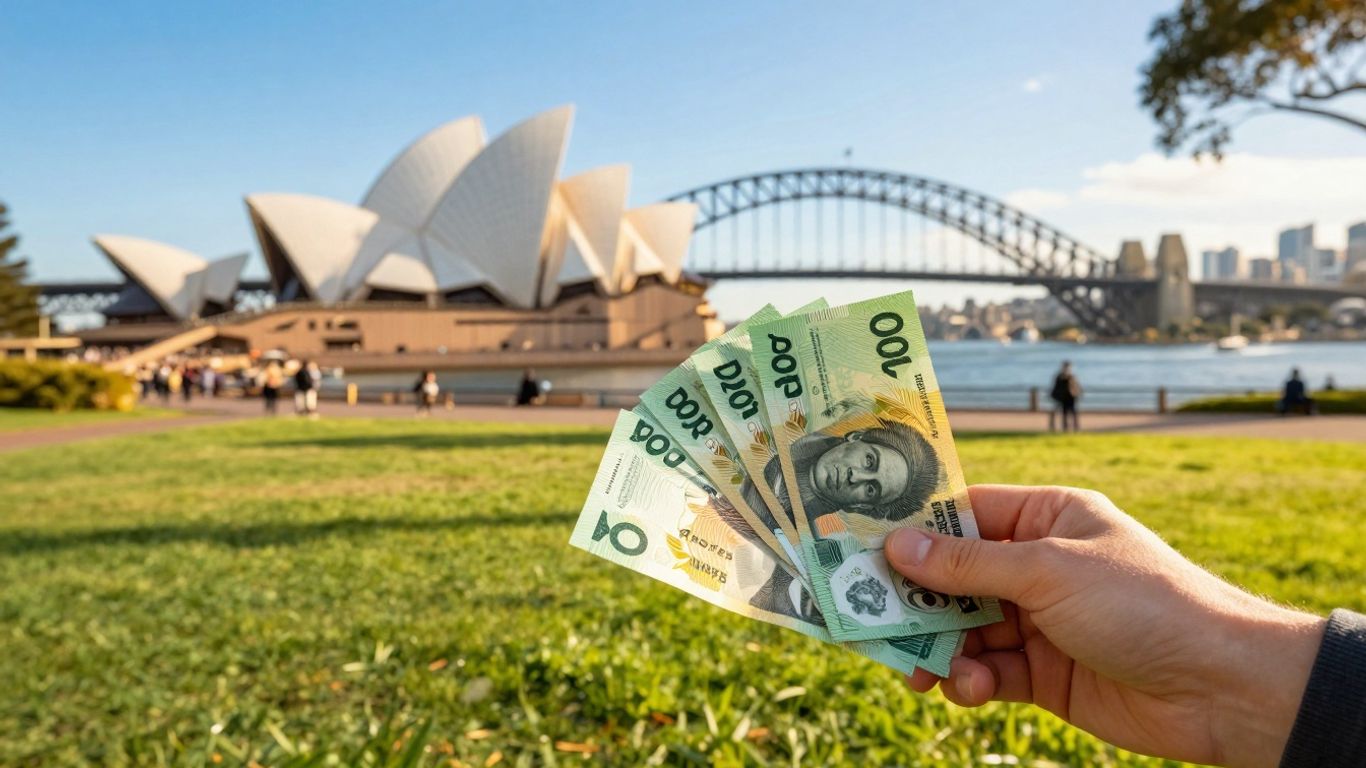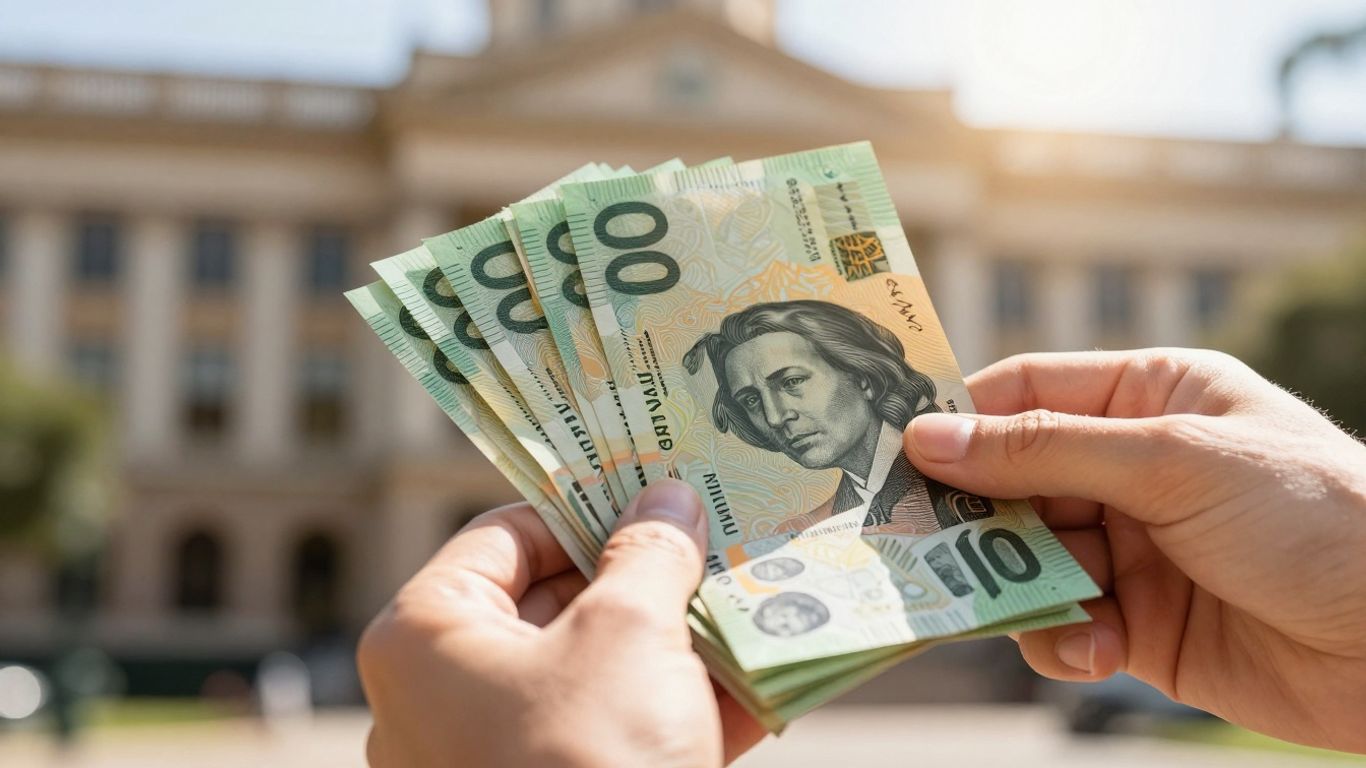Feeling like your cash just vanishes once payday hits? You’re not alone. With costs going up all over Australia, keeping your wallet happy can feel like a real challenge. But learning clever ways to save money isn’t just about having a bit extra; it’s about feeling more secure and less stressed. Whether you’re saving for a rainy day, a deposit on a house, or just want a bit more breathing room, small changes can make a big difference. We’ll go through some straightforward tips to help you spend less and save more, so you can feel more in control of your finances.
Key Takeaways
- Get a handle on where your money goes by tracking income and expenses to find those sneaky leaks.
- Set clear savings goals, both big and small, using the SMART method to keep you on track.
- Make saving automatic by setting up direct deposits or using apps that round up your purchases.
- Build a safety net with an emergency fund, starting small but being consistent, and keep it in a high-interest account.
- Look for ways to cut back on big expenses like housing, transport, and insurance, and be smart about everyday spending like food and subscriptions.
Understanding Your Spending Habits

Alright, let’s get real about where your hard-earned cash is actually going. You might think you’ve got a handle on things, but often, money just seems to vanish into thin air, doesn’t it? The first step to saving more is figuring out exactly what’s happening with your money. It sounds a bit boring, but trust me, it’s the foundation for everything else.
Track Your Income and Outgoings
This is where you get down and dirty with the numbers. Grab a notebook, use a spreadsheet, or download one of those handy apps your bank offers. For a month, just write down every single dollar that comes in and every single dollar that goes out. Seriously, everything. That morning coffee, the parking ticket, the streaming service you barely use – it all adds up.
Here’s a simple way to break it down:
- Income: List all your paychecks, any side hustle money, or even birthday cash.
- Outgoings: This is the big one. Break it down into categories like rent/mortgage, groceries, transport, bills, entertainment, and those little impulse buys.
It might look a bit scary at first, but seeing it all laid out is super helpful.
Become Mindful of Your Spending
Once you’ve tracked your spending for a bit, you’ll start to see patterns. These are your ‘money leaks’ – those sneaky expenses that chip away at your savings without you even noticing. Think about those subscriptions you forgot you signed up for, or those daily coffees that cost a fortune over a year. Maybe it’s buying lunch out every single day when packing your own would save you heaps.
It’s easy to spend money without thinking, especially when you’re just tapping your card or phone. Those small, regular expenses can really add up over time, turning into a significant chunk of your budget before you even realise it.
What makes you want to spend money? Is it stress? Boredom? Seeing something shiny on social media? Maybe it’s just walking past your favourite shop on the way home. Understanding these triggers is key. If you know that a tough day at work often leads to an online shopping spree, you can plan for it. Maybe you decide to call a mate instead, go for a walk, or have a pre-planned ‘treat’ that doesn’t cost much.
Emotional triggers, like feeling down or stressed, can lead to impulse buys. Environmental triggers, such as ads or sales, can also tempt you. Social pressures to keep up with friends might also play a part.
Identify Hidden Money Leaks
These are the little things that drain your bank account without you even noticing. They’re often disguised as convenience or small treats, but over time, they become significant. Think about those streaming services you pay for but never watch, or the daily takeaway coffee that adds up to hundreds of dollars a year. Even small things like buying bottled water when you could have filled a reusable bottle at home can be a leak. Pinpointing these leaks is the first step to plugging them.
Some common leaks include:
- Unused subscriptions (gym memberships, streaming services, apps)
- Daily coffees or takeaway lunches
- Impulse purchases, especially online
- Convenience buys (like bottled water or pre-packaged snacks)
- Late fees on bills
Setting Up Your Savings Strategy
Right, so you’ve got a decent idea of where your cash is going. That’s a huge first step, honestly. Now, let’s get serious about where you actually want that money to end up. Without a clear destination, saving can feel a bit like just drifting along, you know? Having some solid goals makes it way easier to stay on track, especially when life throws you a curveball or a really tempting sale pops up.
Set Clear Financial Goals
First things first, what are you actually saving for? Is it something you want in the next few months, like a new phone or a weekend away? Or are you thinking bigger picture, maybe for a house deposit down the track, a new car in a few years, or even retirement?
- Short-Term Goals (Under 1 year): These are usually for things you want relatively soon. Think about building a small emergency fund (a grand is a good start), saving for a holiday, or paying off a small debt.
- Long-Term Goals (Over 1 year): These are the bigger ticket items that need a bit more patience. Examples include saving for a house deposit, paying off a mortgage, or investing for your future.
Having both types of goals means you get the satisfaction of hitting smaller targets while still working towards those life-changing big ones. It keeps things interesting and stops you from getting discouraged.
To make your goals actually happen, you need to make them SMART. This is a pretty common acronym, but it works for a reason: Specific, Measurable, Achievable, Relevant, and Time-bound. Just saying "I want to save more" isn’t really going to cut it.
Automate Your Savings
Ever feel like your pay cheque just vanishes before you’ve even had a chance to blink? Setting up a system to automatically move money into savings is one of the smartest moves you can make. It takes the decision-making out of it, meaning you save before you even think about spending. It’s like putting your savings on autopilot, and honestly, it’s a game-changer for building up that nest egg without feeling the pinch.
- Direct Deposits: This is probably the most straightforward way. When your wages hit your account, have a portion automatically transferred straight into your savings account. Most banks let you set this up easily online. You can choose a fixed amount or a percentage of your pay. The key is to do it as soon as you get paid, so the money is out of sight, out of mind.
- Round-Up Apps: These apps are brilliant for those little bits of cash you barely notice. When you make a purchase, the app rounds up the amount to the nearest dollar and transfers the difference into your nominated savings account. It might seem like pennies, but over time, all those spare coins really add up.
- Automate Investments: If you’re looking to grow your money over the long term, setting up automatic contributions to your superannuation or other investment accounts is a solid plan. This consistent approach helps you benefit from compound growth and makes investing a regular habit.
Build an Emergency Fund
Having a solid safety net is pretty important, right? It’s not just about having a bit of extra cash lying around; it’s about feeling secure when life throws you a curveball. Think of it as your personal buffer against unexpected bills or job hiccups. This security allows you to sleep better at night, knowing you can handle whatever comes your way without going into debt.
- Start Small and Be Consistent: Don’t get overwhelmed by the idea of saving for months of expenses. If your budget is tight, even putting aside a small amount regularly makes a difference. Think of it like building a habit. Maybe you start by saving $50 from each paycheque. Once that feels comfortable, you can bump it up.
- Dedicated Account: The idea is to stash away enough money to cover your essential living costs for a few months – usually between three and six. You want this money somewhere accessible but not too easy to dip into for non-emergencies. A separate savings account is usually the go-to.
- High-Interest Accounts: Once you’ve got that emergency fund growing, you want it to work for you a bit. Look into high-interest savings accounts. While they might not make you rich, the extra interest earned can help your money grow a little faster than a standard account. Some banks offer bonus interest rates if you meet certain conditions.
Smart Ways to Cut Down Expenses
Right, let’s get stuck into how we can actually trim down those everyday costs. It’s not about living like a hermit, but more about being a bit savvy with where your hard-earned cash is going. You’d be surprised how many little things add up without you even noticing.
Cancel Unused Subscriptions
Be honest, who hasn’t signed up for a free trial and then completely forgotten about it? Or maybe you’ve got a couple of streaming services you barely touch, or an app you downloaded ages ago and never use. These monthly charges might seem small, like $10 or $15 here and there, but they really do start to pile up. Have a good look through your bank statements and credit card bills. You might find a few sneaky ones you can ditch. Cancelling just one or two of these could easily free up $50 or more each month. That’s a decent chunk of change back in your pocket.
Reduce Food Waste and Shop With a List
This one’s a biggie. We’ve all been there – buying groceries with the best intentions, only for half of it to end up in the bin a week later. It’s a total waste of money. The best way to tackle this is to actually plan your meals for the week. Before you even step foot in the supermarket, take a good look at what you’ve already got in the fridge and pantry. Then, make a proper shopping list based on your meal plan and what you actually need. And here’s the golden rule: stick to that list like glue when you’re in the store. It stops those impulse buys that you don’t really need.
Here’s a quick way to think about it:
- Check your pantry and fridge first: See what you already have.
- Plan your meals: Decide what you’ll eat for the week.
- Make a detailed list: Based on your meal plan and existing stock.
- Stick to the list: Resist those tempting extras.
Take Water From Home Instead of Buying
Grabbing a bottled water when you’re out and about seems easy enough, right? But honestly, it adds up. Most of us have a reusable water bottle these days. Make it a habit to fill it up before you leave the house. Whether you’re off to work, the gym, or just heading out for a walk, having your own water bottle means you’re not tempted to fork out for expensive bottled water. It’s a small change, but it makes a difference, and it’s way better for the environment too. Think about it – buying one bottle of water a day at $3 a pop adds up to over $1000 a year! That’s a lot of cash for something you can get for free from the tap.
It’s easy to get caught up in the convenience of buying things on the go. But when you stop and think about it, many of these small, regular purchases are just little leaks in your budget. By being a bit more prepared and mindful, you can plug these leaks and keep more of your hard-earned cash.
Tackling Your Biggest Bills
Right, let’s get stuck into the big stuff. It’s easy to get lost in the weeds with small savings, but honestly, the real gold is often found by looking at those hefty bills that land in your inbox.
Review Insurance Policies Annually
Insurance. You hope you never need it, but you absolutely need it. The trick is not to overpay for it. Seriously, don’t just let your policies roll over year after year with the same company. It’s like leaving money on the table. Make it a point to shop around and compare quotes from different insurers at least once a year. Think about your car insurance, your home and contents, even your health cover. You might be surprised at how much you can save just by getting a few different prices. Sometimes, you can even lower your premium by slightly increasing your excess, but only if you’ve got a solid emergency fund to back it up, of course. Always give the fine print a good read, too, to make sure you’re actually covered for what you need.
Explore Savings on Housing and Transport
Housing is usually the biggest drain on our wallets, isn’t it? If you’re renting, could you find somewhere a bit cheaper, maybe a bit further out or a smaller place? If you own your home, refinancing your mortgage might be worth a look, but definitely check those interest rates carefully. Beyond the rent or mortgage, let’s talk energy bills. Simple stuff like turning off lights, unplugging appliances you’re not using, and taking shorter showers really does add up. A smart thermostat could be a good shout if you’re heating or cooling a lot. Even washing clothes in cold water can trim those costs. It’s all about being a bit more aware of how much you’re using.
And transport? How do you get around most days? If it’s always the car, consider alternatives. Walking or cycling for short trips is a no-brainer. Public transport is often way cheaper than running a car, especially when you factor in fuel, insurance, and all those little services. If you do need a car, make sure it’s a fuel-efficient one, and keep up with the servicing – it helps with mileage. Carpooling is another good one, saves on fuel and wear and tear. Planning your errands so you can do them all in one go can also save you a few bucks on fuel.
Compare Utility and Phone Plans
This is another area where you can often find some decent savings without too much hassle. Utility providers and phone companies are always trying to snag new customers, which means they often have better deals than what you’re currently on. Don’t be afraid to pick up the phone or jump online and see what else is out there. You might find a cheaper plan for your electricity, gas, or internet. The same goes for your mobile phone. Bundle deals can sometimes be a good option, but always check if you’re actually getting a better price or just more stuff you don’t need. It pays to do a bit of research every year or so.
Making conscious decisions about your largest expenses can free up a surprising amount of money. It often requires a bit of research and a willingness to change habits, but the payoff is significant.
Maximising Your Income and Credit

Alright, let’s talk about getting more bang for your buck, not just by cutting back, but by actually boosting what’s coming in and using your credit smarts. It’s about making your money work harder for you, plain and simple.
Check Eligibility for Government Entitlements
Did you know there are government benefits and concessions out there that you might be eligible for? Things like family tax benefits, energy bill concessions, or even cheaper public transport passes. It’s worth doing a bit of digging on government websites or chatting with a local community centre to see if you qualify for anything. It’s basically free money that can make a real difference to your budget. Don’t leave it on the table!
Use Credit Wisely and Avoid Debt
Credit cards and loans can be handy tools, but they can also be a massive drain if you’re not careful. The key is to use them wisely. Always aim to pay off your credit card balance in full each month to avoid those nasty interest charges. If you’ve got existing debt, making a plan to pay it down should be a top priority. It frees up your future income, which you can then put towards your savings goals instead of just servicing old purchases. Think about comparing different credit options too, just to make sure you’re not paying more than you need to. Managing your credit well is a big part of building financial security and can even help improve your borrowing power for things like a home loan.
Consider Renting Out Unused Space
Got a spare room collecting dust? Or maybe a parking spot you never use? Think about turning that unused space into a little income stream. Websites and apps make it pretty straightforward to list a room for rent, either short-term for holidaymakers or long-term for a steady tenant. Even renting out your parking spot can bring in a bit of extra cash each month, especially if you live in a popular area. It’s a great way to make your property work for you without much extra effort.
Sometimes, the best way to save more is simply to earn more. This doesn’t always mean quitting your job and starting a business, though that’s an option for some! It could be as simple as picking up a few extra shifts, selling items you no longer need, or finding a side hustle that fits around your current commitments.
Clever Everyday Money-Saving Tactics
Sometimes the biggest savings come from the little things we do every day. It’s not about deprivation, but about making smarter choices that add up. Let’s look at some easy ways to keep more cash in your pocket without feeling like you’re missing out.
Look for Free Entertainment Options
Who says you need to spend a fortune to have a good time? Australia is packed with free activities if you know where to look. Think about hitting the beach, exploring national parks, or just going for a scenic walk. Many local councils also put on free events, especially during school holidays or on weekends. Check out community notice boards or your local council’s website. You might be surprised at the concerts, markets, or outdoor movie nights happening right on your doorstep.
- Picnics in the park
- Bushwalking and hiking trails
- Free museum days or local art gallery exhibitions
- Community festivals and markets
- Visiting local libraries for books, magazines, and sometimes even free workshops
Consider Second-Hand Purchases
Buying new is often the default, but have you thought about the world of pre-loved goods? Websites like Gumtree, Facebook Marketplace, and even local op-shops are treasure troves. You can find everything from furniture and clothing to electronics and books, often in great condition and for a fraction of the original price. It’s amazing what you can pick up for next to nothing if you’re patient and persistent. Plus, it’s a great way to be more sustainable.
Take Advantage of Rewards Programs
Most of us use loyalty cards or apps without really thinking about them. But these programs can actually save you money if you use them strategically. Whether it’s collecting points at the supermarket, getting cashback on your credit card, or earning discounts at your favourite coffee shop, make sure you’re actually using the rewards you earn. Don’t let those points expire! Some programs even offer birthday treats or special member-only sales.
Small, consistent habits can lead to significant financial gains over time. It’s about being mindful of where your money goes and making conscious decisions, even for the smallest purchases.
Wrapping It Up
So, there you have it – a heap of straightforward ideas to help you keep more of your hard-earned cash. It’s not about making huge, scary changes, but more about tweaking things here and there. Whether it’s just keeping an eye on where your money’s going, setting up a little bit to be saved automatically each payday, or remembering to pack your own water bottle, these small wins really do add up. Start with whatever feels easiest for you, and before you know it, you’ll be feeling a lot more in charge of your finances. You’ve got this!
Frequently Asked Questions
How can I figure out where my money is going?
It’s pretty simple, mate! Just jot down everything you earn and everything you spend. You can use a notebook, a spreadsheet, or even an app on your phone. This helps you see where your cash is actually going and if you’re accidentally splashing out on things you don’t really need, like too many coffees or subscriptions you’ve forgotten about.
What’s the best way to start saving money?
The smartest way is to make saving automatic. Set up your bank to move a bit of cash into your savings account right after you get paid, before you even have a chance to spend it. Think of it like paying yourself first! Using apps that round up your purchases and save the change can also add up over time without you even noticing.
How much money should I have in an emergency fund?
Ideally, you want enough saved to cover your living costs for about three to six months. This is your safety net for unexpected stuff, like losing your job or needing a sudden repair. Start small if you need to, even $20 a week makes a difference and builds up over time.
Are there any big expenses I can cut down on?
Definitely! Look closely at your biggest bills like rent or your mortgage, your electricity and gas, and how you get around. Sometimes just comparing different phone plans, insurance policies, or even looking at ways to save on petrol or public transport can free up a surprising amount of cash each month.
What are some easy everyday money-saving tricks?
Loads of little things help! Try packing your own water bottle instead of buying drinks, making a shopping list and sticking to it to avoid impulse buys at the supermarket, and looking for free fun like going to the park or checking out local events. Also, consider buying things second-hand when you can.
Should I be worried about my subscriptions?
Yeah, definitely check your subscriptions! It’s easy to sign up for streaming services, apps, or magazines and then forget about them. These small monthly costs can really add up. Go through your bank statements and cancel anything you’re not really using. You’ll be surprised how much you can save!





